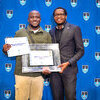EBE students tackle HIV & AIDS in the workplace
23 November 2011 | Story by Newsroom Seeing red: HAICU's Lucina Reddy presents student Vere Shaba with her shopping vouchers, one of the prizes offered as part of HAICU's Managing HIV in the EBE Industry competition.
Seeing red: HAICU's Lucina Reddy presents student Vere Shaba with her shopping vouchers, one of the prizes offered as part of HAICU's Managing HIV in the EBE Industry competition.
Two UCT engineering students can finish the year in style. Literally.
Phathutshedzo Mamathoni won a makeover with sponsor Dress Sense, and Vere Shaba won Cavendish shopping vouchers for their entries in the Managing HIV in the EBE Industry competition, run by the HIV/AIDS Institutional Co-ordination Unit (HAICU) this semester.
Open to all third- and fourth-year students in the Faculty of Engineering & the Built Environment (EBE), the competition set out to emphasise the importance of "equipping all within the EBE industry with the tools to respond effectively towards managing the HIV pandemic", explains HAICU's Sean Brown.
This fits in with the objectives of the Higher Education HIV/AIDS Programme (HEAIDS), whose framework policy states the need "to build HIV and AIDS content into teaching and learning with the necessary scope and depth, allowing graduates to be competent in HIV and AIDS issues and... to use this knowledge in their careers", explains Brown.
The HEAIDS prevalence survey conducted in 2009 goes on further to say that there are "strong perceptions that HIV and AIDS have not been sufficiently incorporated into the academic curriculum".
Competition entrants attended a briefing workshop that focused on how companies in the sector can respond effectively and appropriately to HIV. HAICU partnered with Engineers Without Borders to emphasise to students the importance of a "broad and enlightened" education.
Students then had to design a PowerPoint presentation detailing the context within which the pandemic is driven, suggesting an appropriate response from employers and explaining the importance of incorporate teaching about such matters into the EBE faculty's formal curriculum.
"Why train us to be leaders of industry, but not understand our staff's basic needs for learning?" observed one student.
The construction industry is the third most affected, after the mining and transport sectors. And the least responsive, says Brown.
"Prevalence is a worrying 21% amongst operators and drivers, yet comprehensive teaching about HIV and AIDS in the workplace has not yet been integrated into the EBE faculty."
 This work is licensed under a Creative Commons Attribution-NoDerivatives 4.0 International License.
This work is licensed under a Creative Commons Attribution-NoDerivatives 4.0 International License.
Please view the republishing articles page for more information.










